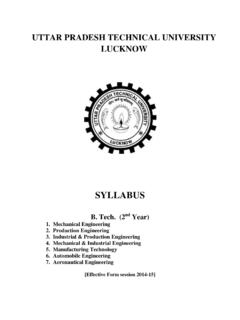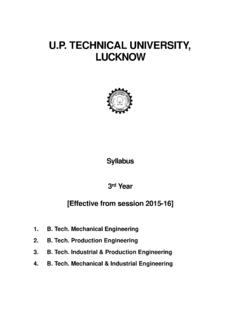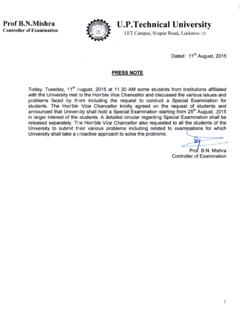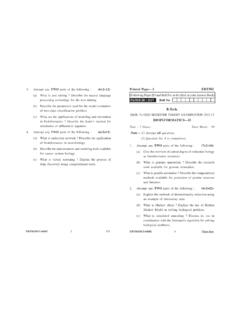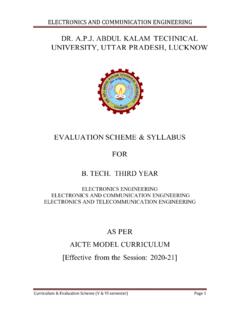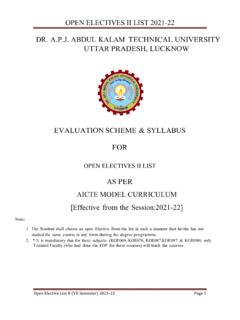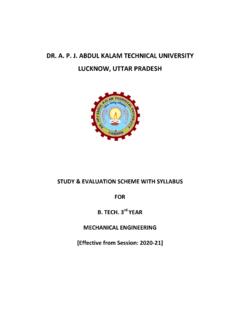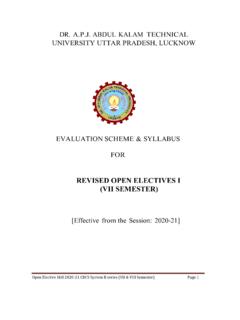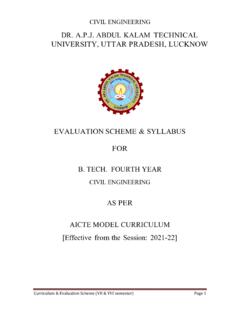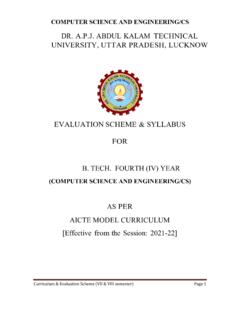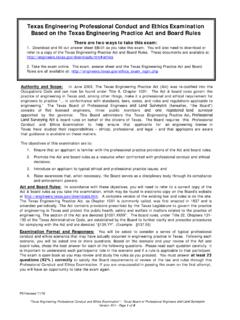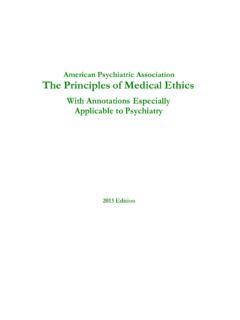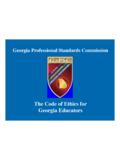Transcription of Universal Human Values and Professional Ethics
1 A Foundation course In Universal Human Values and Professional Ethics Universal Human Values and Professional Ethics [L-T-P: 3-0-0] Course Objectives This introductory course input is intended 1. To help the students appreciate the essential complementarily between ' Values ' and 'SKILLS' to ensure sustained happiness and prosperity, which are the core aspirations of all Human beings 2. To facilitate the development of a Holistic perspective among students towards life and profession as well as towards happiness and prosperity based on a correct understanding of the Human reality and the rest of Existence.
2 Such a holistic perspective forms the basis of Universal Human Values and movement towards value-based living in a natural way 3. To highlight plausible implications of such a Holistic understanding in terms of ethical Human conduct, trustful and mutually fulfilling Human behavior and mutually enriching interaction with Nature Thus, this course is intended to provide a much needed orientational input in value education to the young enquiring minds. Course Methodology 1. The methodology of this course is explorational and thus universally adaptable. It involves a systematic and rational study of the Human being vis- -vis the rest of existence.
3 2. It is free from any dogma or value prescriptions. 3. It is a process of self-investigation and self-exploration, and not of giving sermons. Whatever is found as truth or reality is stated as a proposal and the students are facilitated to verify it in their own right, based on their Natural Acceptance and subsequent Experiential Validation. 4. This process of self-exploration takes the form of a dialogue between the teacher and the students to begin with, and then to continue within the student leading to continuous self-evolution. 5. This self-exploration also enables them to critically evaluate their pre-conditionings and present beliefs.
4 Course Syllabus: Universal Human Values and Professional Ethics [L-T-P: 3-0-0] The whole course is divided into 5 modules. After every two lectures of one hour each, there is a 2 hour practice session. The teachers are oriented to the inputs through an eight to ten day workshop (Teachers Orientation Program). The Teacher s Manual provides them the lecture outline. The outline has also been elaborated into presentations and provided in a DVD with this book to facilitate sharing. The teacher is expected to present the issues to be discussed as propositions and encourage the students to have a dialogue. The process of dialogue is enriching for both, the teacher as well as the students.
5 The syllabus for the lectures is given below: UNIT 1: Course Introduction - Need, Basic Guidelines, Content and Process for Value Education 1. Understanding the need, basic guidelines, content and process for Value Education 2. Self Exploration what is it? - its content and process; Natural Acceptance and Experiential Validation- as the mechanism for self exploration 3. Continuous Happiness and Prosperity- A look at basic Human Aspirations 4. Right understanding, Relationship and Physical Facilities- the basic requirements for fulfillment of aspirations of every Human being with their correct priority 5. Understanding Happiness and Prosperity correctly- A critical appraisal of the current scenario 6.
6 Method to fulfill the above Human aspirations: understanding and living in harmony at various levels UNIT 2: Understanding Harmony in the Human Being - Harmony in Myself! 7. Understanding Human being as a co-existence of the sentient I and the material Body 8. Understanding the needs of Self ( I ) and Body - Sukh and Suvidha 9. Understanding the Body as an instrument of I (I being the doer, seer and enjoyer) 10. Understanding the characteristics and activities of I and harmony in I 11. Understanding the harmony of I with the Body: Sanyam and Swasthya; correct appraisal of Physical needs, meaning of Prosperity in detail 12. Programs to ensure Sanyam and Swasthya - Practice Exercises and Case Studies will be taken up in Practice Sessions.
7 UNIT 3: Understanding Harmony in the Family and Society- Harmony in Human - Human Relationship 13. Understanding Harmony in the family the basic unit of Human interaction 14. Understanding Values in Human - Human relationship; meaning of Nyaya and program for its fulfillment to ensure Ubhay-tripti; Trust (Vishwas) and Respect (Samman) as the foundational Values of relationship 15. Understanding the meaning of Vishwas; Difference between intention and competence 16. Understanding the meaning of Samman, Difference between respect and differentiation; the other salient Values in relationship 17. Understanding the harmony in the society (society being an extension of family): Samadhan, Samridhi, Abhay, Sah-astitva as comprehensive Human Goals 18.
8 Visualizing a Universal harmonious order in society- Undivided Society (Akhand Samaj), Universal Order (Sarvabhaum Vyawastha )- from family to world family! - Practice Exercises and Case Studies will be taken up in Practice Sessions. UNIT 4: Understanding Harmony in the Nature and Existence - Whole existence as Co-existence 19. Understanding the harmony in the Nature 20. Interconnectedness and mutual fulfillment among the four orders of nature- recyclability and self-regulation in nature 21. Understanding Existence as Co-existence (Sah-astitva) of mutually interacting units in all-pervasive space 22. Holistic perception of harmony at all levels of existence - Practice Exercises and Case Studies will be taken up in Practice Sessions.
9 UNIT 5: Implications of the above Holistic Understanding of Harmony on Professional Ethics 23. Natural acceptance of Human Values 24. Definitiveness of Ethical Human Conduct 25. Basis for Humanistic Education, Humanistic Constitution and Humanistic Universal Order 26. Competence in Professional Ethics : a) Ability to utilize the Professional competence for augmenting Universal Human order b) Ability to identify the scope and characteristics of people-friendly and eco-friendly production systems, c) Ability to identify and develop appropriate technologies and management patterns for above production systems.
10 27. Case studies of typical holistic technologies, management models and production systems 28. Strategy for transition from the present state to Universal Human Order: a) At the level of individual: as socially and ecologically responsible engineers, technologists and managers b) At the level of society: as mutually enriching institutions and organizations Guidelines and Content for Practice Sessions UNIT 1: Course Introduction - Need, Basic Guidelines, Content and Process for Value Education PS 1: Introduce yourself in detail. What are the goals in your life? How do you set your goals in your life? How do you differentiate between right and wrong?
